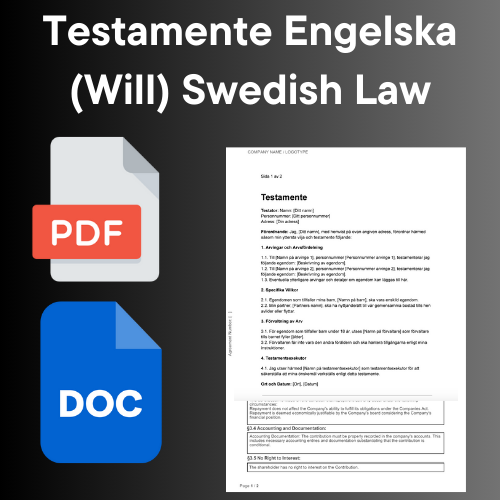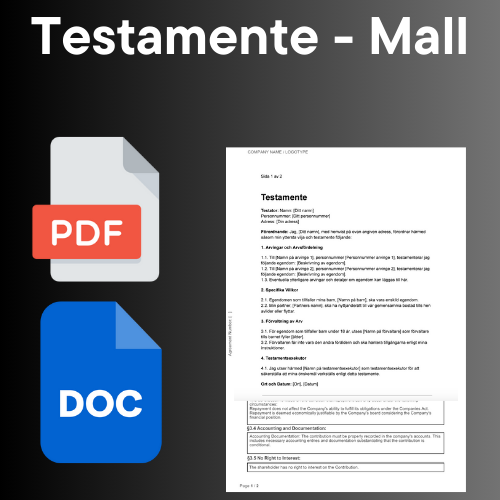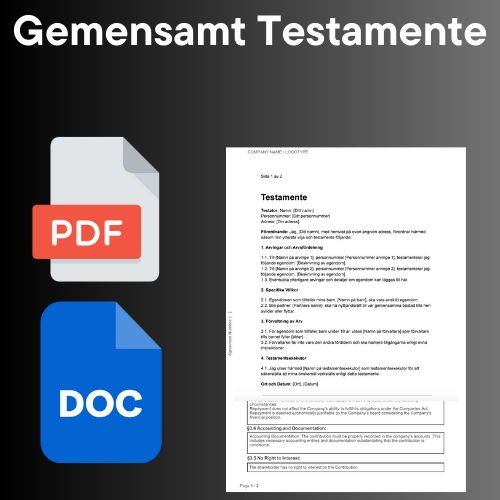If there is no will? - Legal information
Share
A will is a legal document that sets out how a person's property will be distributed after their death. But what happens if there is no will? This question is central to many, especially since around half of all Swedes pass away without having drawn up a will. The consequences of this can be significant, both for the heirs and the distribution of the deceased's assets. In this article we will explore what happens when someone dies without a will, and why it can be important to make a will to ensure that one's last wishes are respected.
Table of contents
- What happens if there is no will?
- The order of succession according to law
- Surviving spouse's right
- Cohabitation without a will
- Why is it important to write a will?
- How to write a will?
- Summary
- Termination
What happens if there is no will?
If a person dies without having made a will, the distribution of their estate follows the rules found in the Inheritance Code, the Swedish legislation governing inheritance law. This means that the deceased's property is distributed according to a predetermined order of succession of heirs, often called "the legal order of succession". This order may have consequences that deviate from what the deceased might have wanted.
The order of succession according to law
When there is no will, the inheritance goes primarily to the deceased's closest relatives. The Swedish inheritance system is divided into three inheritance classes:
- First class of inheritance: This group includes the children of the deceased, or if they have died, their grandchildren. The children inherit equal parts of the estate. This means that if a person with two children dies without a will, each child will inherit 50% of the estate.
- Second class of inheritance: If the deceased has no children or grandchildren, the inheritance goes to the parents. If the parents are also deceased, the inheritance passes to the deceased's siblings or nieces.
- Third class of inheritance: If there are no heirs in the first two classes, the inheritance goes to the deceased's grandparents. If they have also died, the inheritance goes to their children, ie the deceased's aunts, uncles, aunts and uncles.
If there is no heir in any of these classes, the inheritance goes to the Allmänna arvsfonden.
Surviving spouse's right
A special situation arises when the deceased leaves behind a spouse but no will. According to Swedish law, a surviving spouse is entitled to the entire inheritance if the deceased has no children from a previous relationship (special children). If there are illegitimate children, they have the right to receive their inheritance directly, which may affect the surviving spouse's financial situation.
Cohabitation without a will
For unmarried partners, it is especially important to make a will if they wish their partner to inherit their property. According to Swedish inheritance law, cohabitants do not have automatic inheritance rights. Without a will, the entire inheritance goes to the deceased's relatives, which can lead to a surviving partner having to move out of their home if the deceased's relatives claim their inheritance rights.
Why is it important to write a will?
Making a will is the only way to ensure that one's property is distributed according to one's wishes after death. There are several reasons why a will can be important:
- Personal control: By writing a will, you can decide for yourself how your property will be distributed and to whom. This may include specific assets that you wish to give to a particular person or organization.
- Protection for survivors: A will can help protect surviving family members, especially if you are married or cohabiting, by ensuring they receive a fair share of the inheritance.
- Avoid conflicts: A clear will can reduce the risk of family conflicts about how the inheritance should be distributed.
- Charitable distribution: Through a will, you can also choose to donate a portion of your property to a charity.
How to write a will?
Writing a will does not have to be complicated, but there are certain formal requirements that must be met for it to be valid:
- Written form: The will must be in writing.
- Signatures and witnesses: It must be signed by you and witnessed by two people who are not heirs or named in the will.
- Clarity and clarity: The will should be clearly written to avoid misunderstandings or disputes.
Summary
When someone dies without having written a will, the distribution of the deceased's assets is governed by Swedish law. This law, like the Inheritance Code, determines the order in which heirs receive a share of the inheritance, which can lead to undesirable consequences for the surviving spouse or common-law partner. To ensure that one's wishes are respected and to protect loved ones, it is therefore important to consider making a will. It is a way of maintaining control over one's assets and minimizing the risk of conflicts between heirs.
Termination
In conclusion, not having a will can lead to one's property not being distributed in the way desired, and in the worst case it can cause financial uncertainty for those close to you. By drawing up a will, you can ensure that your last wishes are respected and that your survivors are taken care of. It is an act that provides security for the future.




